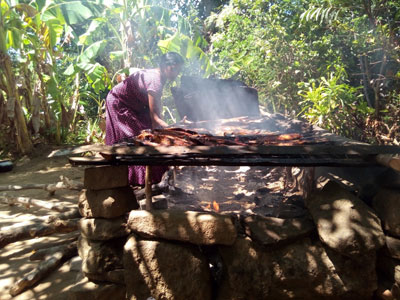Innovative ovens for fish-smoking improve Batti lives
View(s):The traditional method of fish-smoking in Unnichchai, a small fishing community in the Batticaloa district sees women spending many hours tending to fish laid out on mesh over smoking coals. Health hazards from smoke inhalation are high, while the output from such intensive labour is often low. That is now changing with the introduction of new smoking ovens pioneered by the Food and Agriculture Organisation of the United Nations (FAO) under a programme funded by the European Union (EU), a joint media release said.

Ms. Kopalapillai Theivamalar makes her living from fish-smoking in Sri Lanka. Using the traditional fish-smoking method can cause health hazards from smoke inhalation.
“The first thing I noticed was that the new technology helps me save time,”said Kopalapillai Theivarmallar who makes her living from fish-smoking to provide for her three daughters. “Before, I spent a total of 12 hours on two consecutive days drying and smoking the fish, and I used the old method of iron mesh. Now, 6 to 7 hours are enough to finish one smoking. It gives me plenty of time to take care of my children and do household chores,” she said.
Since 2008 FAO has worked on developing the FTT-Thiaroye, an improved fish smoking and drying oven technology. The oven can be purpose built, or the smoke-capturing chimney, oil-catching trays and other elements can be added to an existing oven. It is designed to improve fuel-efficiency in fish-smoking by encapsulating heat and smoke. It also addresses health hazards suffered by small-scale fish dryers – the vast majority of whom are women.
In the Batticaloa district, around 150 families are engaged in fish-smoking activities. The traditional smoking method is done in the open, making the fish prone to spoilage from rain and external contamination. Strong winds can lengthen the process and often results in lesser-quality fish that sell at lower prices.
“With the method of iron mesh, our smoked fish is of poor quality, they are sold at 600 to 750 rupees per kilo. This is a very low price. The money we earn is not even enough to send our children to school,” said Fransis Devamalar, a fish smoker who heads her family of four children.
The FAO technology was first introduced in Africa, where 12 countries have now adopted it. Women using old methods of fish-smoking over an open fire often suffer eye and skin irritations and respiratory disease from the smoke. However, African women who have adopted the new method have improved their health, significantly increased their income, reduced their costs, cut down on losses, improved the quality and safety of their smoked fish, and were able to improve their family’s food security and nutrition.


